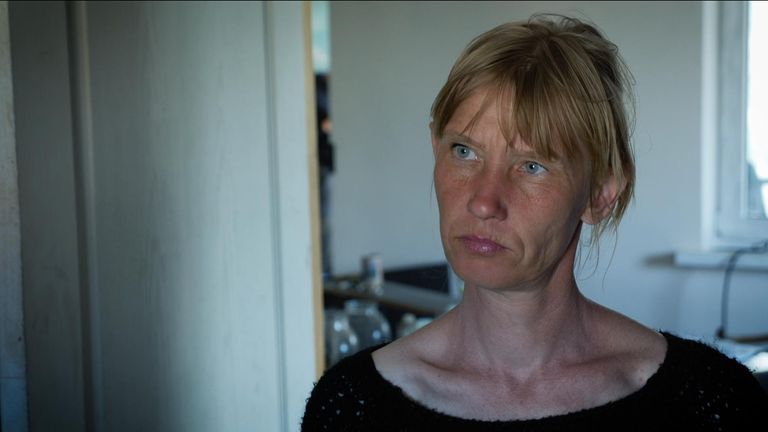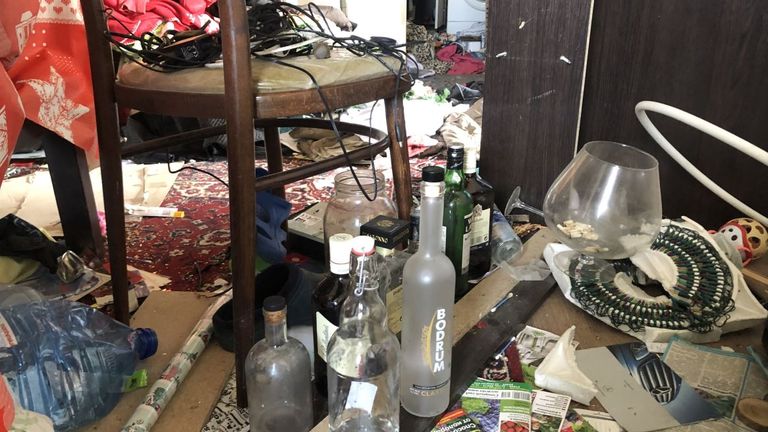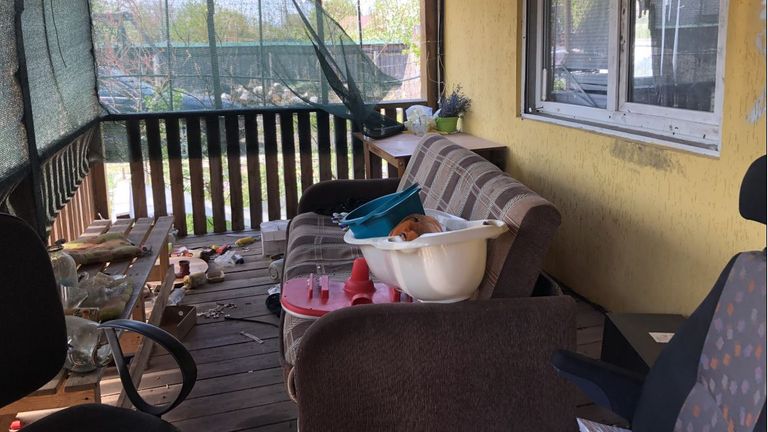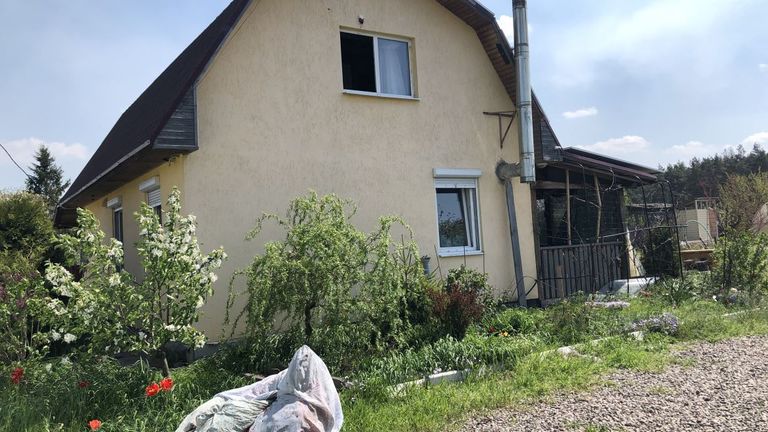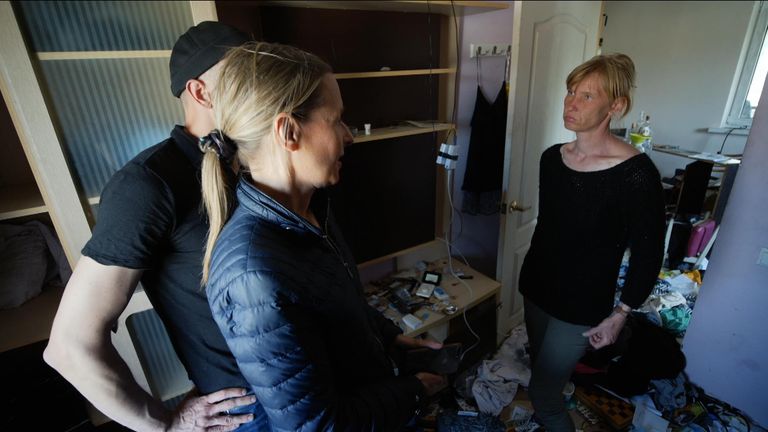[ad_1]
Pointing to a grubby, grey sofa in the corner of a small room in her neighbour’s house, the Ukrainian mother said that was where a teenage Russian soldier raped her.
It happened during an evening of terror, cruelty and murder in a rural village outside Kyiv.
Vika, 42, said she decided to speak about the attack on camera to encourage other rape survivors in Ukraine to talk about what Russian forces did to them.
“I want women who also [have been raped] – I know there are a lot of them – not to stay silent,” she told Sky News in the dingy room where the attack took place in March.
“You need to talk. They [the Russian soldiers] need to be punished.”
Russia ‘has lost a third of ground forces in Ukraine’ – latest updates from war
The Ukrainian authorities are conducting at least 10 active rape investigations involving Russian forces, with many more pending, including alleged rapes of children and men.
It is a difficult and deeply sensitive task because many of the victims are too traumatised to speak out or are unwilling to report an assault, said deputy interior minister Kateryna Pavlichenko.
Instead of simply waiting for people to come forward, her ministry has set up special police teams to raise awareness in local communities about how to report war crimes involving sexual violence by Russian soldiers – as well as advice on accessing comprehensive support.
“Unequivocally, I want to say that this is a type of weapon in conditions of war,” Ms Pavlichenko said.
“We will take the maximum measures to ensure that these crimes are recorded and transferred to international institutions and considered by an international tribunal.”
Russia has denied allegations of rape by its soldiers.
Vika is having to live with the reality of what a Russian soldier, who gave his name as Daniel, 19, allegedly did to her on the night of 9 March.
A neighbour, Natasha, 44, was also raped in the same house at the same time by a second soldier who first shot dead her husband.
That soldier gave his name as Oleg, 21.
She, too, agreed to speak about her ordeal.
Both women said it began after dark, when they were at their respective homes a few doors from one another on the same quiet street.
Russian forces were in control of the village as part of a failed push towards Kyiv.
At around 9pm or 10pm, three Russian soldiers, who smelled of alcohol, knocked on the door of Vika’s house demanding that she went with them.
Fearful for her life, she had no choice but to obey.
The group visited a second house but decided against the woman there.
Around this time, a gunshot was fired by Oleg. It grazed the leg of the third soldier, who was described as the commander. He went to seek medical help.
The other two servicemen, still with Vika, continued to Natasha’s house.
Vika said that Natasha’s husband, Sasha, answered the door to Oleg, who pointed his gun at him and said he wanted his wife.
Sasha told him to leave, saying Oleg would surely not kill him because he, too, was Russian.
But when he turned to go back into his house, the young soldier opened fire again, shooting Sasha in the back of the neck. He fell to the floor.
The soldier then woke Natasha and forced her outside.
The two women were dragged to a deserted house on the same street. The owners had fled at the start of the war. The group entered through an open window.
Oleg took Natasha upstairs, while Vika was shoved into a small room downstairs.
Returning to the scene of the crime, Vika looked at the sofa where she was assaulted.
It is set against a wall that is painted in baby pink, with a pretty cherry blossom print in one corner.
She recounted the rape in a single monologue. Her words were stated clearly and carefully, her voice strong, broken only occasionally by a short cough.
Daniel, 19, was the same age as the younger of her two sons.
Vika said she tried to reason with him but he told her not to distract him and just to “do her job”. She had been warned she would be killed if she did not cooperate.
Vika said she was raped multiple times.
“He treated me not like a woman or a mother but, I am sorry to say this, like a prostitute,” she said. “He was very aggressive… I don’t know, did he take Viagra? Or maybe some drugs. He was crazy. Thank God he didn’t kill me and I was [ultimately] able to escape.”
At the same time, Oleg raped Natasha on a mattress in a larger upstairs bedroom.
She has since fled to Austria with her teenage son.
Speaking by telephone, Natasha told Sky News that Oleg had told her that her son would be harmed if she resisted.
“At that moment, I thought only of my son so that he would not kill him,” she said.
She described feeling “like a living corpse – deadlock – I did not know what to do”.
She said the rape lasted about an hour-and-a-half. Afterwards, the soldier went downstairs to look for Daniel who was no longer there. He then fled the scene, too.
Natasha said she crept home, broken, only to face an even deeper trauma – the reality of her husband lying dead in the darkness on the stone floor of their tiny entrance hall.
“How did I feel? I sat until the morning. I could not sleep,” she said, her voice steady, her sentences short.
Both women had to stay in the village, terrified that their attackers would find and kill them. The village remained under the control of Russian forces until the end of March.
Valentina, 65, Natasha’s mother, who lived with her daughter, said the soldiers would rotate every few days, with new troops coming in. She said a subsequent unit had been shocked upon hearing what Daniel and Oleg had done.
Once all Russian troops retreated as part of a wider withdrawal across the north of Ukraine, Vika and Natasha were able to give evidence to the police and prosecutors about the attacks.
They both want their rapists caught and punished.
In the past week, a group of prosecutors has visited the house where the assaults happened with Vika.
The once-smart family home was ransacked by Russian troops, who appear to have used it as a squalid base, wrecking furniture and destroying rooms.
Empty alcohol bottles line the floor by the front door, along with a pile of cigarette butts in a huge glass bowl. Every room is littered with the belongings of the family who own the property.
Clothes, books, children’s toys, even Monopoly cards are strewn in a chaotic jumble. Crude graffiti is daubed on a wall in the hall. It also appears to identify the name of the military unit at the village.
Vika recorded her testimony on camera with the prosecution team at the house. It is set to be used in future criminal proceedings.
As they work to build a case, the authorities have also collected DNA evidence from the property, and are trying to identify the individual suspects.
One of the prosecutors involved said some of the war crimes Russia is accused of committing appear to have been lone acts by individual soldiers, but in other cases there was an order from a commander allowing criminality.
“It is possible to say the goal was to raise morale – for the troops to feel like they are winner and have permission to commit any crime without fear that they will be held responsible,” said Valeri Zymoglyad, from the Office of the Prosecutor General of Ukraine.
As time creates a distance from the horror of 9 March, Vika and Nastasha remain deeply traumatised.
“It is very difficult,” said Natasha, speaking from her refuge in Austria.
“Not everyone can go through this. But I have a son, I can’t wait and feel sorry for myself.”
Vika has been given a little dog that belonged to one of her relatives. She said he is a comfort. “I sleep badly. I have not a good feeling inside of me… a lot of tears.”
:: If you would like help with any of the issues raised in this article, see Sky’s Viewer Support page.
[ad_2]


